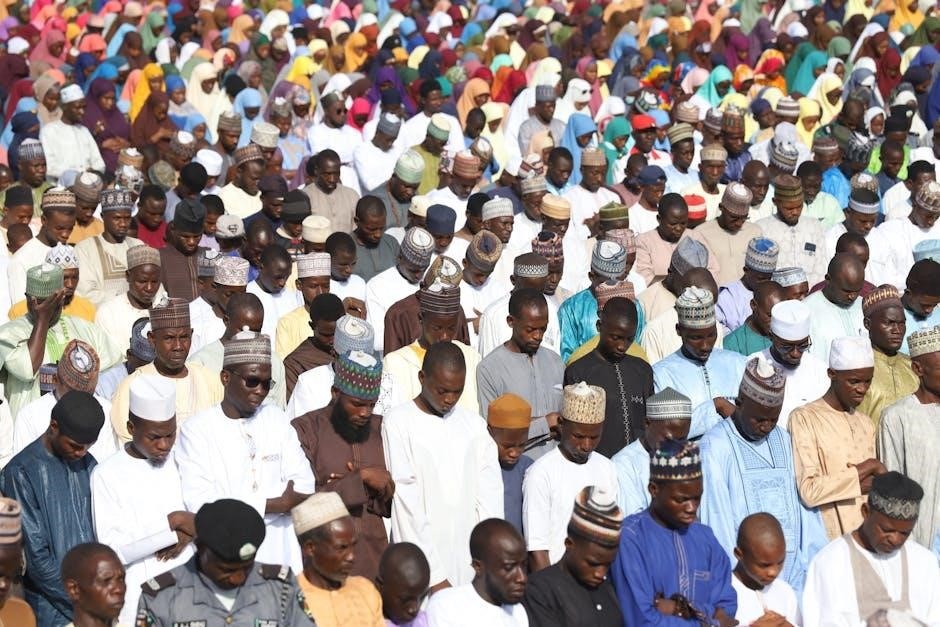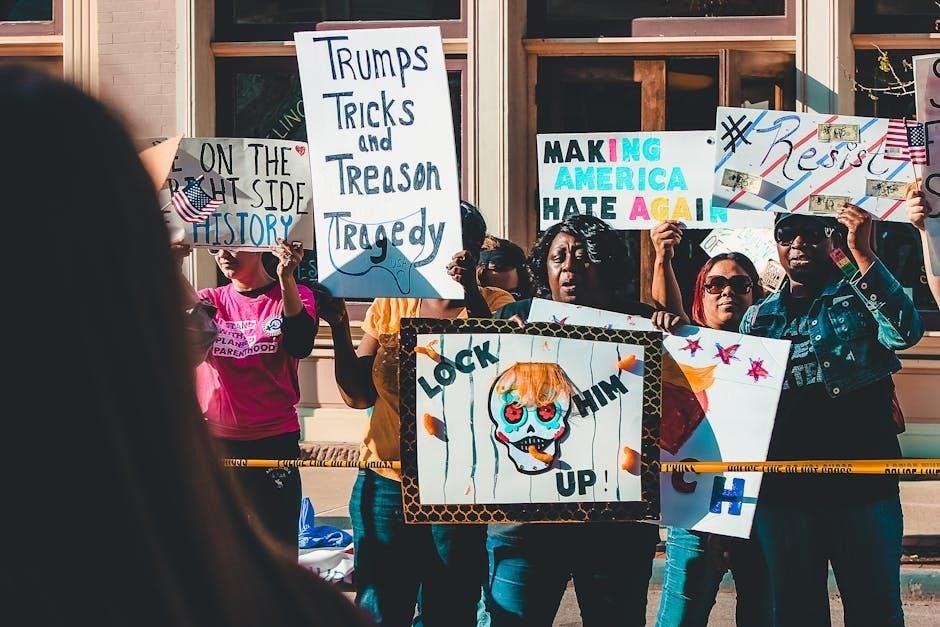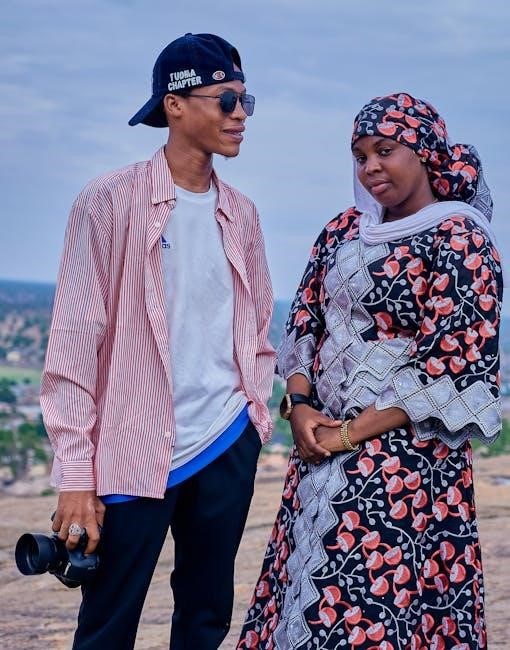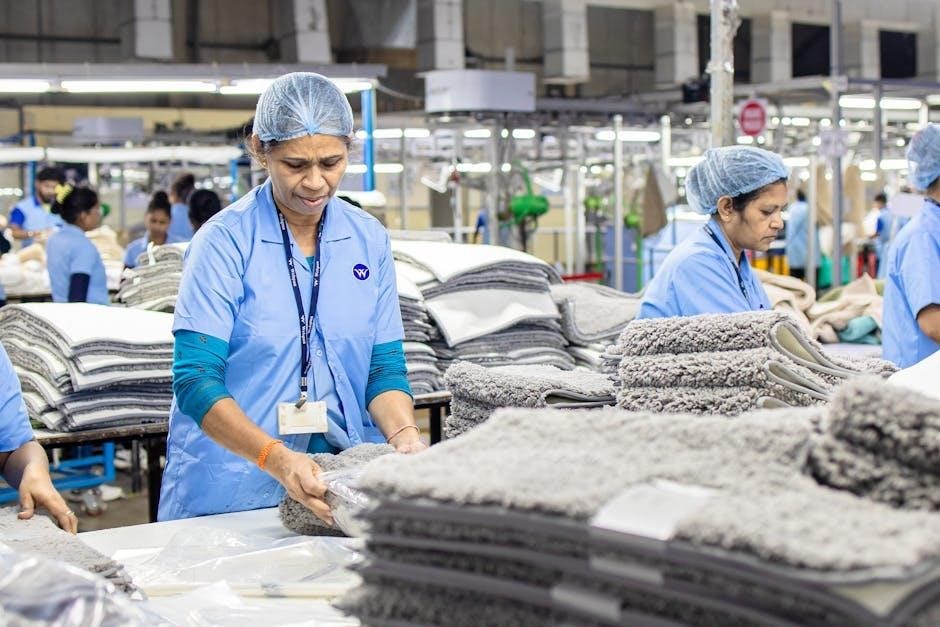Misogyny, rooted in psychological trauma, societal norms, and media influence, perpetuates discrimination and violence against women, fostering inequality and undermining social cohesion globally.
1.1 Defining Misogyny: Hatred, Contempt, and Prejudice Against Women
Misogyny refers to the deep-seated hatred, contempt, or prejudice directed toward women, often manifesting as sexism or discrimination. It can be overt or subtle, perpetuating gender inequality and societal harm. Rooted in psychological and cultural factors, misogyny is a complex issue that undermines women’s dignity and opportunities, contributing to systemic gender-based violence and discrimination globally.
1.2 The Prevalence of Misogyny in Modern Society
Misogyny remains prevalent in modern society, manifesting through various forms such as online harassment, workplace discrimination, and media representation. Studies suggest that 50% of young men in Britain believe feminism has gone too far, while global statistics show one in three women face physical or sexual violence. This highlights the persistent challenge of misogyny in contemporary times, impacting both personal and societal levels.
Psychological Origins of Misogyny in Men
Misogyny often stems from psychological trauma, early life experiences, and unconscious hatred, shaped by societal norms and personal relationships, contributing to deeply rooted prejudicial attitudes toward women.
2.1 The Role of Trauma and Early Life Experiences
Trauma, particularly involving trusted female figures, can instill unconscious misogyny in men. Early life experiences, such as neglect or abuse, shape negative perceptions of women, fostering contempt and prejudice. These formative events often manifest in adulthood as deep-seated resentment, contributing to misogynistic behaviors and attitudes that are difficult to recognize and address.
2.2 The Unconscious Nature of Misogynistic Attitudes
Misogynistic attitudes often operate subconsciously, with many men unaware of their deep-seated contempt for women. These unconscious biases, shaped by early traumas or societal conditioning, manifest in subtle prejudices or overt hostility. Such hidden attitudes are particularly challenging to address, as they remain unacknowledged even by those who harbor them, perpetuating harmful behaviors and beliefs without conscious recognition.
Societal and Cultural Factors Contributing to Misogyny
Societal and cultural factors, such as media representation, toxic masculinity, and gender norms, perpetuate misogyny by normalizing discrimination and contempt towards women in various contexts.
3.1 The Influence of Media and Online Platforms
Media and online platforms amplify misogynistic views through toxic content, fostering hostile environments where hatred towards women is normalized. Algorithms often promote divisive material, enabling the spread of sexist ideologies and contributing to the radicalization of individuals, particularly within online communities like incels, where misogyny is openly expressed and reinforced.
3.2 The Role of Toxic Masculinity and Gender Norms
Toxic masculinity, emphasizing dominance and aggression, perpetuates misogyny by conditioning men to view women as inferior. Rigid gender norms enforce harmful stereotypes, fostering entitlement and resentment. These societal constructs contribute to violence and discrimination, trapping men in cycles of anger and women in cycles of oppression, hindering gender equality and mutual respect.

The Incel Movement and Online Communities
The incel movement, short for involuntary celibates, represents online communities where men express misogynistic views, often blaming women for their perceived sexual and romantic failures, fostering hatred and violence.
4.1 The Rise of Involuntary Celibates (Incels) and Their Misogynistic Discourse
The incel movement, comprising men who identify as involuntary celibates, has surged online, promoting misogynistic ideologies that blame women for their perceived sexual rejection. This discourse often escalates into violent rhetoric, advocating for gender-based discrimination and harassment. Incels view women as responsible for their emotional and sexual deprivation, fostering a culture of resentment and toxicity.
4.2 The Connection Between Incel Ideology and Violence Against Women
Incel ideology often glorifies violence as a form of retribution against women for perceived rejection. This mindset has led to tragic incidents, such as mass shootings, where attackers openly identify with incel beliefs. The dehumanization of women within incel communities fosters an environment where violence is normalized, creating a direct link between misogynistic rhetoric and real-world harm against women.
The Relationship Between Misogyny and Violence
Research indicates that misogynistic attitudes significantly predict violence against women, as contempt and hatred toward women often manifest in harmful behaviors.
5.1 Misogyny as a Predictor of Violence Against Women
Misogynistic beliefs often serve as a precursor to violence against women, as they foster contempt and justify harmful actions. Studies show that men holding such views are more likely to engage in physical and sexual aggression, perpetuating cycles of abuse and intimidation. This highlights the critical need to address these attitudes to reduce violence.
5.2 The Psychological and Emotional Triggers of Misogynistic Violence
Misogynistic violence often stems from psychological triggers like unresolved trauma, feelings of helplessness, and unconscious resentment. These emotions, rooted in early life experiences, can manifest as anger or contempt toward women. Low self-esteem and fear of rejection may also fuel aggression, creating a cycle of violence that perpetuates harm and reinforces harmful gender dynamics.

The Role of Mental Health in Misogynistic Attitudes
Mental health issues, such as depression and low self-esteem, often contribute to misogynistic attitudes, fostering feelings of resentment and contempt toward women in some men.
6.1 Depression, Anxiety, and Feelings of Helplessness
Depression and anxiety often manifest in men as misogyny, stemming from feelings of helplessness and emotional pain. These mental health struggles can lead to resentment and contempt toward women, as men may project their internal suffering outward. Such psychological turmoil creates a toxic cycle, perpetuating harmful attitudes and behaviors rooted in unresolved emotional distress.
6.2 The Link Between Low Self-Esteem and Misogyny
Men with low self-esteem often develop misogynistic attitudes as a coping mechanism for feelings of inadequacy. By demeaning women, they seek to elevate their own status and mask personal failures. This psychological defense fosters contempt and hostility, creating a cycle where low self-worth fuels prejudice, further entrenching harmful gender dynamics in society.

The Impact of Misogyny on Women and Society
Misogyny inflicts profound emotional and psychological harm on women, perpetuating discrimination and limiting opportunities. It also undermines societal progress by fostering inequality and division, hindering collective well-being.
7.1 The Emotional and Psychological Toll on Women
Misogyny imposes a heavy emotional and psychological burden on women, fostering feelings of helplessness, low self-esteem, and anxiety. It often leads to mental health struggles, including depression, as women confront systemic discrimination and hostility. The normalization of misogynistic attitudes exacerbates these challenges, creating a toxic environment that undermines women’s well-being and perpetuates gender-based inequality and trauma.
7.2 The Broader Societal Consequences of Misogyny
Misogyny perpetuates systemic inequality, hindering gender equality and social progress. It fosters a culture of discrimination, limiting women’s opportunities and contributing to economic disparities. Misogyny also erodes social cohesion, normalizing violence and reinforcing harmful stereotypes. By marginalizing women, it stifles collective potential, creating a society that fails to thrive due to unequal participation and representation, ultimately undermining humanity’s shared advancement and well-being.

Addressing Misogyny: Strategies for Change
Education, awareness campaigns, and therapy are key to combating misogyny. Promoting healthy masculinity and fostering empathy can transform harmful attitudes, creating a more equitable and inclusive society.
8.1 Education and Awareness Campaigns
Educational programs and awareness campaigns are crucial in addressing misogyny by promoting gender equality and challenging harmful stereotypes. These initiatives encourage critical thinking about societal norms and media representation, fostering empathy and respect. By integrating such content into school curricula and public campaigns, society can cultivate a more inclusive environment, reducing prejudice and violence against women.
8.2 The Role of Therapy and Counseling in Combating Misogynistic Attitudes
Therapy and counseling play a vital role in addressing misogynistic attitudes by exploring underlying psychological factors such as trauma, low self-esteem, and unconscious biases. These interventions help individuals recognize and challenge harmful beliefs, fostering healthier relationships and attitudes toward women. Professional guidance enables personal growth and accountability, contributing to a societal shift toward gender equality and respect.

The Role of Men in Combating Misogyny
Men play a crucial role as allies by challenging harmful attitudes and stereotypes, promoting healthy masculinity, and advocating gender equality to foster a more equitable society.
9.1 Men as Allies in the Fight Against Misogyny
Men can actively challenge misogynistic behaviors by fostering empathy and understanding. Educating themselves about gender equality and supporting initiatives that promote women’s rights are essential steps. By advocating for healthy masculinity and rejecting toxic norms, men can help dismantle systemic sexism and create a more inclusive society where women thrive without fear of discrimination or violence. Collective effort is key.
9.2 The Importance of Healthy Masculinity in Reducing Misogyny
Healthy masculinity, characterized by emotional expression and respect for equality, plays a crucial role in reducing misogyny. By rejecting toxic norms and embracing empathy, men can dismantle sexist attitudes. Education and societal encouragement of healthy masculinity foster mutual respect and collaboration, creating a safer, more equitable environment for women and promoting gender equality effectively.
Legal and Policy Measures to Address Misogyny
Implementing hate crime laws and policy reforms can criminalize misogynistic acts, fostering accountability and societal change to reduce gender-based violence and discrimination effectively.
10.1 Hate Crime Laws and Their Application to Misogynistic Acts
Hate crime laws can criminalize misogynistic acts, targeting behaviors fueled by hatred toward women. These laws aim to hold perpetrators accountable and deter future offenses. However, enforcement often faces challenges, such as proving intent and societal attitudes toward gender-based violence. Strengthening legal frameworks remains crucial to addressing misogyny effectively and promoting justice for victims of gender-motivated crimes.
10.2 Policy Interventions to Promote Gender Equality
Policy interventions are vital to dismantling systemic gender inequality. Measures include enforcing anti-discrimination laws, promoting equal pay, and supporting education initiatives. These policies address the root causes of misogyny by challenging harmful stereotypes and empowering women. Effective implementation requires collaboration between governments, organizations, and communities to create a society where gender equality is both valued and achievable.
The Role of Media in Perpetuating or Combating Misogyny
Media reflects and shapes societal attitudes toward women, often perpetuating harmful stereotypes or challenging them through progressive representation and discourse.
11.1 The Impact of Media Representation on Gender Attitudes
Media representation significantly influences gender attitudes, perpetuating stereotypes that can fuel misogyny. Portrayals of women as subordinate or sexualized reinforce harmful beliefs, while positive depictions can challenge and reshape societal views, promoting equality and respect. The role of media in shaping perceptions underscores its power to either perpetuate or combat misogynistic ideologies in modern society. It is crucial for media to adopt responsible representation to foster a more equitable world.
11.2 The Responsibility of Media in Promoting Gender Equality
Media holds a pivotal role in promoting gender equality by challenging stereotypes and amplifying diverse voices. Responsible representation can dismantle misconceptions that fuel misogyny, fostering empathy and understanding. By prioritizing balanced narratives and inclusive storytelling, media can actively combat harmful attitudes and contribute to a culture of respect and equality for all genders, ultimately mitigating the societal roots of misogyny.

Case Studies and Real-Life Examples
Analyzing real-life examples, such as the incel movement and the Plymouth shooting, reveals the dangerous consequences of misogynistic ideologies and the need for community-wide responses.
12.1 Notable Incidents of Misogynistic Violence and Their Aftermath
The Plymouth shooting by Jake Davison, linked to incel ideology, highlights the deadly consequences of misogyny. Such incidents often lead to public outcry, policy debates, and calls for mental health reforms, emphasizing the need to address root causes of misogynistic violence through education and societal change to prevent future tragedies.
12.2 Success Stories of Overcoming Misogynistic Attitudes
Stories of transformation highlight men overcoming misogynistic attitudes through education, therapy, and awareness campaigns. Many have embraced healthy masculinity, becoming allies for gender equality. These journeys often involve self-reflection, accountability, and a commitment to change, inspiring others to challenge harmful beliefs. Such successes demonstrate the potential for societal progress and the importance of addressing root causes of misogyny to foster a more equitable world.
Misogyny’s roots in trauma, culture, and psychology highlight the need for education and empathy to foster equality. Future efforts must focus on dismantling harmful norms and promoting healthy masculinity to create a more equitable society for all.
13.1 Summarizing the Key Findings
The analysis reveals that misogyny stems from a complex interplay of psychological trauma, societal norms, and unconscious biases. It manifests as contempt, violence, and systemic discrimination, profoundly impacting women’s lives and societal equality. Addressing this requires education, awareness, and therapy, alongside policy reforms to dismantle toxic gender norms and promote healthier masculinity for a more inclusive future.
13.2 The Path Forward: Creating a More Equitable Society
Addressing misogyny requires collective efforts to dismantle harmful norms and promote gender equality. Education, therapy, and policy reforms are essential to challenge toxic attitudes and behaviors. Encouraging men to embrace healthy masculinity and allyship can foster societal change. By addressing root causes and fostering empathy, we can build a future where women and men coexist with mutual respect and equality.
